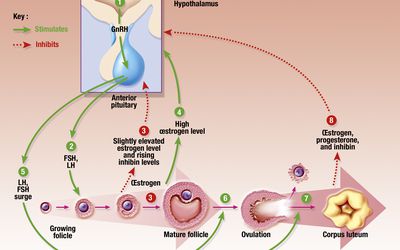Your Hypothalamus and Your Menstrual Cycle

Your Hypothalamus and Your Menstrual Cycle
The hypothalamus is an important part of your neuroendocrine system. It controls the interaction between your endocrine or hormone-producing system and certain parts of your nervous system. Your hypothalamus is responsible for producing the hormone that triggers the start of your menstrual cycle.
Where Is the Hypothalamus Located?
If you drew a line from the middle of your eyebrows directly back to the center of your brain you would locate a pea-sized structure called the hypothalamus. What this part of the brain lacks in size it makes up for in function.
What Does the Hypothalamus Do?
Think of the hypothalamus as the "smart home control system" of your body. Its primary responsibility is to keep your body functions well balanced and stable. The hypothalamus controls and coordinates much of your body’s involuntary functions like temperature regulation, hunger, thirst, sleep, and mood. By acting in response to input from the brain and from other hormone-producing centers in the body, the hypothalamus adjusts the body’s internal balance or homeostasis.
Another important function of the hypothalamus is to regulate the pituitary gland. The hypothalamus produces substances called releasing hormones that activate the pituitary gland to stimulate other hormone-producing parts of your body like the thyroid and the ovary. By controlling the release of these hormones, the hypothalamus is also directly involved in your metabolism, growth, sex drive, and of course your menstrual cycle.
Menstrual Cycle Control
Your hypothalamus produces a hormone called GnRH or gonadotropin-releasing hormone. Under normal conditions, your body releases GnRH in a pulsatile fashion. This intermittent release causes the pituitary gland to coordinate the release of two other hormones called FSH or follicle stimulating hormone and LH or luteinizing hormone. FSH, in turn, stimulates the ovary to produce estrogen and LH stimulates the ovary to produce progesterone. The cyclic changes of these hormones are responsible for your menstrual cycle which includes both ovulation and if no conception or pregnancy occurs, your menstruation or period.
When Things Go Wrong
Since the hypothalamus is the control panel of your menstrual cycle, certain conditions that disrupt the body's balance and interfere with the healthy functioning of the hypothalamus can also interfere with your menstrual cycle. When the release of GnRH does not happen in the normal pulsatile fashion, FSH and LH are not properly produced by the pituitary gland. Without stimulation from these hormones, the ovaries do not produce estrogen and progesterone and ovulation does not occur. Without ovulation, there is no menstruation.
The technical term for missing your period is amenorrhea or literally without bleeding. When you miss your period because your hypothalamus is not functioning normally it is called hypothalamic amenorrhea. Common causes of hypothalamic amenorrhea include:
Hypothalamic amenorrhea is a common cause of missed periods. Depending on the extent and duration of stress on your body you may miss an occasional period or you may stop menstruating altogether.
Manipulating the Control Center
Understanding the importance of the intermittent release of GnRH from the hypothalamus led researchers to develop a type of medication that temporarily turns down your ovaries' production of estrogen and progesterone. Maintaining a constant level of GnRH in your bloodstream turns down the pituitary release of FSH and LH which in turns shuts down ovarian production of estrogen and progesterone. This class of medications known as gonadotropin-releasing hormone agonists includes leuprolide acetate or Lupron and goserelin acetate or Zoladex. These medications have an important role in treating several gynecologic conditions like uterine fibroids and endometriosis.
Source: https://www.verywellhealth.com/what-is-the-hypothalamus-gland-2721837